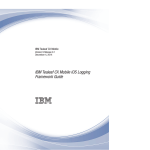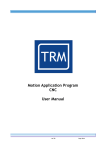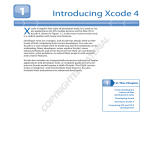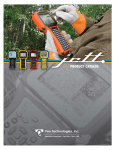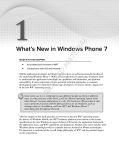Download Building More Windows Phone 7 Applications September 28, 2010
Transcript
HTTP://www.dotnetrocks.com Carl Franklin and Richard Campbell interview experts to bring you insights into .NET technology and the state of software development. More than just a dry interview show, we have fun! Original Music! Prizes! Check out what you've been missing! Text Transcript of Show #597 (Transcription services provided by PWOP Productions) Building More Windows Phone 7 Applications September 28, 2010 Our Sponsor HTTP://www.telerik.com/ Building More Windows Phone 7 Applications September 28, 2010 Lawrence Ryan: .NET R o c k s ! Episode #597 with guests Jeff Walker and Ahmed Zaman, recorded live Friday, September 24, 2010. [Music] Lawrence Ryan: This episode is brought to you by Telerik, by Haystack, and by Franklins.NET Training Developers to Work Smarter, and now here's Carl and Richard. Carl Franklin: Thank you very much. It's Carl, it's Richard. We're in London at the DevCon Conference 2010. Richard Campbell: do today? Richard Campbell: Carl Franklin: It's the only way to read an XML file, or write an XML file for that matter. So you basically create an XDocument object from a file, and you can do it with a URL too if you add a little extra code, and then you can basically navigate through it using LINQ. It's a wonderful thing. Richard Campbell: thing. Querying XML is a wonderful Carl Franklin: Yup. It really is. Richard Campbell: I love it. Indeed we are. What did you Carl Franklin: It just takes all the pain and suffering out of XML. Carl Franklin: What did I do today? Oh, you know, I pretty much slept off my jet lag today, Richard. What did you do? Richard Campbell: Nice. I went to Trafalgar Square, and the National Art Gallery, and Buckingham Palace, and all those London-y things. Carl Franklin: Yeah, great places to visit. Richard Campbell: Uh-hmm. Carl Franklin: I have fond memories. Well, anyway, we're here at DevCon. We've been having fun, a little bit of fun so far and just acclimating ourselves. We're going to be doing some speaking tomorrow and recording a show for future reference. Richard Campbell: So who's Richard Campbell: Got an email from Australia. "Hi, Carl and Richard. You guys are evil. Ever since I got my iPhone a couple of years ago, I've fallen in love with it. It's simply so sexy and smooth. Sure, like any technology it irritates me but not often. I've mostly resisted other Apple products, but after two shows, that is show 574 Catching up with Mary Jo Foley, and show 568 Jackson Harper and Chris Hardy on Mono, I now have to get a 27-inch iMac for some MonoTouch development." Ooh. Why? And we got a great interview Richard Campbell: Why does it have to be a 27inch? What's the justification there? Carl Franklin: Yeah, we did which you're going to hear in the show. So we're going to break with tradition and do a Better Know a Framework while on the road. Richard Campbell: Ooh. Carl Franklin: Here it goes. [Music] Richard Campbell: Yup. It's all goodness. Carl Franklin: No more XPath. talking to us, Richard? Carl Franklin: Richard Campbell: yesterday too. The only way to do XML. All right. What have you got? Carl Franklin: Well, I know that I've talked about this but it's such an important class and such a fundamental piece of technology to .NET that I really want to bring people's attention back to it. If you haven't done any XML work in a long time, you may or may not be familiar with System.Xml.Linq.XDocument. Carl Franklin: Richard Campbell: "In my head, I justify it by some of the things that you guys have said." And he is paraphrasing here. "Programming is something you never truly master, but we strive to improve and advance our skills and get out there and learn new languages. This is evil. But on the other hand, building iPhone apps could make you some money." Carl Franklin: You know, I'm glad he was so inspired by Apple products from .NET Rocks! Hey, Steve Jobs, where's my cut? Richard Campbell: Well, and interestingly enough I think this email is from last month and back then it was still, you know, Apple had the rules in place where you weren't allowed to use Mono to build apps. Carl Franklin: Transcription by PWOP Productions, http://www.pwop.com Okay. That's right. Page 2 of 14 Building More Windows Phone 7 Applications September 28, 2010 Richard Campbell: pulled... Although they never actually Carl Franklin: They never enforced it. in Quakers Hill, New South Wales. So I guess we're sending a mug to Australia. Carl Franklin: Richard Campbell: They never pulled any MonoTouch apps, but now they've actually dropped it and I think it's b e cause the FTC was on about why are you doing this. Carl Franklin: And when you say dropped it, you mean drop the restriction. Richard Campbell: that's right. They dropped their restriction, Carl Franklin: Yeah. Richard Campbell: I f y o u 've got questions, concerns, ideas for shows, comments on anything you've heard here, send us an email, [email protected]. Carl Franklin: And don't forget the Billy Hollis' Silverlight 4.0 DVD. It's for sale right now at franklins.net. Also, our friends at Infusion are looking for a few good people. So if you're interested in making a career move, give us a holler or send email to me, [email protected]. So Richard, this is kind of an interesting show. Richard Campbell: Richard Campbell: So now you'r e a l l o w e d . There's no restriction again from using MonoTouch. So it's all good. I'm glad he is doing this. Carl Franklin: Carl Franklin: Wow. That's an interesting idea. Talking about software patterns is difficult to -- I mean, conceptually we can do it but very difficult to illustrate. Carl Franklin: Because we are interviewing two different developers writing two very different kinds of Windows Phone 7 applications. Richard Campbell: Two organizations too behind them. Carl Franklin: Well, and you know, patterns creep into our conversations every once in a while. Sure. Carl Franklin: And that's just the way it goes because they are so ubiquitous. You bet. "Anyway, keep up the That's from Collin Richardson Transcription by PWOP Productions, http://www.pwop.com very different Carl Franklin: Yeah. So we're just going to run each interview separately. They're recorded at different times. Richard Campbell: And in different ways. Carl Franklin: I n d i f f e rent ways. The interview coming up here with Jeff Walker, we recorded on Friday in our usual manner over the phone. But the recording that we did with Ahmed we did here in London yesterday. Well, Sunday. Richard Campbell: Richard Campbell: Yeah. Well, it tends to be so abstracted. I think one of the things Carl is implying here is this idea that these are constructs, these are ideas that are technology agnostic and so that makes it even more abstract but it's something to think about. I'm t h i n k i n g in terms of finding someone who programs on multiple platforms and how they use patterns. Richard Campbell: fantastic work." Uh-hmm. Yeah. Richard Campbell: Let me end off the email here. He says, "On a self-improvement front, I really hate having to do the same thing over and over again and learning, recognizing, and applying patterns seem to me to be an essential tool in the toolbox of every developer. Do you think you guys would be able to get some people on the show to talk about patterns and how they are applied in their job and some lessons they've learned along the way?" Richard Campbell: Sounds good. It was actually in Lester. Carl Franklin: Yeah, in Lester which is north of London. And Richard and I decided to get on the train and go north and meet Ahmed and go out to dinner, and then in the cab ride on the way home we recorded the interview. So enjoy it. Our first guest is Jeff Walker. Jeff has been a software developer for over 20 years, with the last 5 years focused solely on mobile. Currently Jeff works at WHERE Inc., developing the WHERE application for lots of different mobile platforms. Before that, he co-founded AirPrint, which gave mobile users access to stuff like coupons and movie tickets from their cell phones. Jeff's love of cool new toys is what attracted him to mobile many years ago. Now he gets to build them and get paid for it! Welcome, Jeff. Jeff Walker: Thank you. Page 3 of 14 Building More Windows Phone 7 Applications September 28, 2010 Carl Franklin: Where.com , really? Jeff Walker: E-.com. Where.com, really. W-H-E-R- Carl Franklin: How? How did you get that? Jeff Walker: No, we didn't get how.com. Carl Franklin: No, Where. Richard Campbell: Oh, it's going to be in one of those conversations, isn't it? We're going directly to Abbott & Costello just like that? Carl Franklin: I don't know, third base. have you had it for a long time? Jeff Walker: That's correct. So we have coupons in there. It will show you coupons for businesses near you so it just triggers out where you are and then it gives you coupons that you can save away and bring to the store and show him the coupon code and they punch it into the cash register and give you discount. So, Jeff Walker: I think there must have been some sort of bribery involved. I'm not sure. Carl Franklin: Carl Franklin: Yeah. So that's pretty cool. You have these pins, you know, the search radius you can set to half a mile, 5 miles or 25 miles and you get the Google map with the location pins. Is this stuff to do, places to go or you can sort of narrow it down by category? Are you doing coupons here too? Wow. Richard Campbell: Because there was a company before that's called You Locate, right? Carl Franklin: So it's not like there's a bar code or anything like that, or anything you got to print out. Jeff Walker: No. There's no bar code, nothing to print. You just basically have to show your phone to the cashier and they punch in the number. Carl Franklin: Right. That's pretty cool. Jeff Walker: Correct. Yeah, and people were like You, like Y-O-U? What does You Locate mean? Richard Campbell: Smart. Carl Franklin: Yeah. Richard Campbell: name. Exactly. It's a very typical geek Richard Campbell: So this is not just Win Phone 7. You've done this on other platforms as well? Jeff Walker: That's right. So WHERE just seems like, you know, perfect because basically it's all about where you are. Jeff Walker: Yeah, that's correct. Yeah, we've actually got over three million users, active users, and we're growing it like 500,000 per month on basically all the different Smartphone platforms as well as feature phones. Like if you go into AT&T and grab any of their free phones, you'll see WHERE is preloaded on there. Carl Franklin: applications? So it's all about location-based Jeff Walker: That's correct. So it's using your location to give you stuff to do, places to go, movies to see, events to go to, and then that's sort of half of it. Then the other half of our business is basically a local ad network, hyper-local ad network that we've built and we've got a bunch of publishers like Pandora and so forth, as well as ourselves that are using our ad network. So there's kind of two parts to the business. There's the mobile application itself and then there's the ad network. Carl Franklin: So if you click on the search radius and go to 25 miles and you see no little pins in the map, you are in the middle of nowhere. Question answered. Richard Campbell: Oh, no. Jeff Walker: that. Yeah, they would definitely say Transcription by PWOP Productions, http://www.pwop.com Richard Campbell: Nice. Jeff Walker: You know, that's how we make a lot money. A lot of our money is made through preload, the subscription, monthly subscription. Richard Campbell: to WHERE? So the user actually subscribes Jeff Walker: That's correct, yeah, for the feature phones. To the Smartphone, it's generally just all free or ad supported. But for the feature phones, it's subscription based. Richard Campbell: Interesting. Carl Franklin: Nice. Page 4 of 14 Building More Windows Phone 7 Applications September 28, 2010 Richard Campbell: Well, and I guess now you've had experience building apps on all these different platforms. Jeff Walker: That's correct, yeah, and certainly each one is different. I mean, each one has its own very cool aspects, and each one has its own like little surprises that you find in the 11th hour when you're trying to get a product out the door. Richard Campbell: favorite phone? Any highlights? Jeff Walker: Yeah. Actually, for WHERE we actually use the Facebook Friends as a way to sort of connect to you with your friends. You know, you don't have to sort of create WHERE Friends. You just log in using your Facebook credentials and then all of your Facebook friends show up there and you can sort of like places and check into places and stuff like that that shows up in your Facebook feed. So we've got a pretty tight integration with Facebook in particular. What's your Jeff Walker: Well, I tell you I definitely like the Windows Phone 7. I think that's going to be an awesome platform. I can't wait to see some of the hardware. I mean, the one I've been playing with is the LG phone which is a nice piece of hardware. I know that HTC, and Samsung, and others are going to be coming out with Windows Phone 7 devices as well so it will be interesting to see what the hardware looks like for that. I mean, Android devices are awesome. I mean, there are some pretty good ones there. So everyone holds the iPhone too as sort of the standard but frankly, I mean, I think Windows Phone 7 really has some interesting aspects that are, you know, especially this People Hub and Picture Hubs and stuff like that that your listeners might be aware of, but there is some really cool integration that they're doing now. You know, instead of having like a vertical app, like a Facebook app, and then you've got your Twitter app and so forth, all that social network stuff is kind of integrated together into these hubs so you'll see your Facebook updates, and your email, and so forth. So it's pretty cool what they're doing. In like context, it will pull in your contact list from Gmail, from Exchange, from Facebook, and it will just present them all in a linear list rather than having to search around for your contacts. Richard Campbell: Does that UI paradigm and change the way you've built WHERE? Jeff Walker: Not so much. I mean, at this point, a lot of these cool features are kind of not visible yet to the developers so for example I know that like pictures are supposed to be available. I haven't played with it yet, but you're supposed to be able to sort of insert pictures into the list of pictures in your sort of picture feed so you can imagine pictures being posted and Facebook show up in the feed, pictures that are posted from say Flickr or whatever show up there. So that's one aspect that's currently supposed to be open. I haven't played with it yet. Carl Franklin: The Windows Phone is really hip on social media sites. Does WHERE for all these other phones do Facebook and Twitter as well as the Windows Phone 7 does? Transcription by PWOP Productions, http://www.pwop.com Carl Franklin: And is the Windows Phone 7 version ready to go in the marketplace? Jeff Walker: As soon as it opens. I mean, that's supposed to happen today. At least according to rumor, it should be able to -- you know, as soon as it opens, we're ready to post it to the marketplace for approval. Carl Franklin: time this airs. So it should be open by the Jeff Walker: Yeah. I hope so, but that's the rumor and the approval process is supposed to take a few days. Carl Franklin: Right. Jeff Walker: But it sounds like it's much more transparent than say Apple's approval process which is generally a nightmare. Richard Campbell: I mean, it sounds like WHERE is quite organized. This is a big app. It's well connected. You've got a lot of phones out that are already running it. So you'd think for iPhone it would be pretty painless for you. Jeff Walker: You would think. Top 10 in category like on all these different -- you know, on Android, BlackBerry, iPhone, we're generally top 10 in our category even in the extremely crowded apps store but yeah, sometimes it takes a few days, sometimes it takes a couple of weeks, it's just really weird. Certainly we've got rejected for things that we are just so surprised and if you screw anything up as far as reference a method or something in one of their sort of proprietary packages... Carl Franklin: No approval for you. Jeff Walker: the line, pal. Yeah. Start it over. Back in Richard Campbell: Oh, man. Carl Franklin: Yeah. Page 5 of 14 Building More Windows Phone 7 Applications September 28, 2010 Jeff Walker: So anyway, it's certainly have been covered plenty in the press. It is a painful process. Carl Franklin: Maybe your app used the word jobs in a less than a flattering sentence. Jeff Walker: make fun of Steve. That's right. Exactly. Don't Carl Franklin: Job finder, yeah. So does your app on the phone, Windows Phone 7, use Silverlight or XNA or both? Jeff Walker: Actually we're using Silverlight. I mean, actually one of the questions that several people ask at some of the developer conferences were can we mix XNA and Silverlight because I've loved to add some 3-D elements, some gaming elements to this thing, but currently you can't mix and match so you have to sort of pick right out of the gate which way you want to go, XNA or Silverlight. I mean, the Silverlight path is not like you're picking a path which is really the feature. I mean, the Silverlight in Windows Phone 7 is awesome. Carl Franklin: Yeah. Jeff Walker: You can make really nice, rich user experience with it. But yeah, it will be cool when they start to allow you to mix the two, some pop out to a little game inside your app or whatever. That will be cool. Carl Franklin: This portion of .NET Rocks! is brought to you by our good friends at Telerik. We've been blown away by the uptake in the quick adaption of Silverlight. It's no secret though. The platform didn't provide for consistent integration with the Web Analytics Services. Well, not anymore. As you might have already heard, Microsoft announced the Silverlight Analytics Framework which solves the abovementioned problem. But what's also interesting is that Telerik already provides support for the framework. Telerik is the first UI components vendor to offer handlers for the Silverlight Analytics Framework. Using RadControls for Silverlight, you can immediately benefit from the advantages of the platform and start tracking the statistics of your applications. You can read details and download the handlers at telerik.com/silverlight. And hey, don't forget to thank Telerik for supporting .NET Rocks! on their Facebook fan page, facebook.com/telerik. talking to mobile developers, and certainly you'll see it in the press too, this nasty word called fragmentation comes in and basically what that means is that sort of like for the iPhone, for Windows Phone 7, there's like one target issuing for in terms of what hardware is there for, you know, there's a camera there, you've got this clean size, you may or may not have a keyboard, etc, and sometimes like Android does a pretty good job of sort of hiding you from the detail of whether there's a keyboard or not. Windows Phone 7 certainly learned from Android and went up to them in that regard. But like J2ME and BlackBerry, you end up having to essentially port to each device. Sometimes it's even worse than that, you port to each device on each carrier. So say you've got a phone X on AT&T, there might be a slight different variation of that same hardware with different firmware on TMobile so with that fragmentation it ends up costing you a lot more in terms of development and QA. You know, you get the sort of basic app there, but then you end up having to pour it to different devices and both J2ME and BlackBerry sort of suffer from some of that. Richard Campbell: You better define J2ME. Jeff Walker: Oh, okay. Sorry. So like if you walk into an AT&T store, all those free phones allow you to download applications and subscribe to them on a monthly basis. Those applications are typically written in Java using the J2ME platform. It's a Java 2 Micro Edition and they sort of rebranded it Java ME or something like that but it's basically the same stuff. It's essentially a very reduce version of the platform suitable for mobile devices. So like even that Motorola RAZR that you have sitting collecting dust along with all the other piles of old phones... Richard Campbell: My wife is still using hers. Carl Franklin: Brandon Watson called it the drawer of broken dreams. Richard Campbell: W a s i t ...? Oh, it's Brandon Watson, but yeah, that great -- I was just thinking of that line. The drawer of broken dreams is you get it working on one phone and then you go to the drawer, take out the next phone and try it. If it doesn't work and you make tweaks, then you have to go back and test with the first phone again, make sure it works on that one and the second one, then you go back to the drawer of broken dreams for the third phone. Jeff Walker: That's right. So you like programming on the Windows Phone 7. What is your least favorite platform to develop for? Carl Franklin: Yeah. Jeff Walker: W e l l , i t 's probably a tie between say J2ME and Blackberry. They sort of share some of the same aspects. When you start Jeff Walker: And that's the way it is when you're pointing to all these feature phones. It's like you just have to -- it doesn't just work. You have to go Transcription by PWOP Productions, http://www.pwop.com Page 6 of 14 Building More Windows Phone 7 Applications September 28, 2010 in and make tweaks. You see, we've literally got buckets and buckets of phones that we use for testing. Whenever we port to a new phone, we have to get a couple of them. One is a primary development phone and one is a backup for when we break the primary phone. Because, you know, like what happens especially with the J2ME. Richard Campbell: I noticed you said "when." Jeff Walker: Yeah. Oh, absolutely. Well, you know, these phones you're getting, you're getting them from the OEMs, they're prototype devices, they're basically giving them a new firmware every few days because they're doing development on these phones, they're trying to get out so you're never really sure whether it's your software or whether it's this flaky firmware or whatever. I mean, so J2ME is kind of one end of the spectrum in terms of pain and suffering. At least the BlackBerry device, when we get them they're pretty solid. Richard Campbell: Right. Jeff Walker: But, you know, for BlackBerry you end up -- you just look at it. There are a lot of different combinations. There's touchscreen, nontouchscreen, trackball, touchpad keyboards. I mean, some of them have keyboards, some of them don't. Carl Franklin: Right. Jeff Walker: So, you know, you end up having to basically port to each of those different devices. Richard Campbell: well? Are all these different APIs as Jeff Walker: Yeah. That's right. Carl Franklin: Different development tools. Jeff Walker: So for example, the touchscreen, when you touch the screen you're getting event in your application that says, "Hey, somebody just touch something," t h a t 's actually a different API. They scroll event that you might get if you had a trackball. So they actually have to kind of handle both or handle them differently based on what your application does. Richard Campbell: Are you really down to the point where we're just doing a build per platform or per device? Are you trying and make like one BlackBerry app and you've got all this "if trackball then do it this way, if touch then do it that way." Jeff Walker: It's somewhere in between and it's almost like a case-by-case basis. Sometimes we Transcription by PWOP Productions, http://www.pwop.com can say, "Yeah, the build and the curve are pretty close to each other. We can make a build that will do both of those." But the storm, that's totally different. We need a separate build for that. Carl Franklin: Do you have any advice for developers who may have done Silverlight or Windows Forms or something like that, or WPF XNA, and now I want to get into -- or even web development for that matter, now want to get into building apps for Win Forms 7. Jeff Walker: Well, I guess the first thing I would say is you have it so easy. Carl Franklin: Yeah. Jeff Walker: It's like it's not fair you didn't suffer through all of this mobile fragmentation, and pain and suffering that's been going on for the last few years. So as far as Windows Phone 7 in particular, I guess the first thing that you'll see, and I found this in the developer conferences when people went around and sort of said, "Hey, this is what I do," I'm playing around with Windows Phone 7 looking at doing an app and a lot of these people were coming from the web world like many would say "Yeah, I've been developing Silverlight apps for web apps and so forth," you just have to like totally forget anything you knew about web development and start over and think about it in terms of this tinee, tiny, little screen crappy network connectivity sometimes like slow networks, flaky networks especially if you're on AT&T -- no, I did not say that, did I? Carl Franklin: Censor, censor. I feel your pain, let me just say that please. I'm an iPhone user currently and I love it, but you know, sometimes I just wish it was a phone. Jeff Walker: Yeah, yeah, exactly. Carl Franklin: Yeah. Jeff Walker: So you basically have to just like start from scratch and think about, okay, I've got this little teeny space. I mean, I can't make the fonts too small because then people won't be able to read them. I mean, there's a whole bunch of usability stuff that you don't even really think about when you're doing web apps and say, oh yeah, you've got a mouse and this huge, gigantic screen and jeez, you have a keyboard that you can actually type on. Whereas with mobile apps, it's like you sort of want to lean towards clicking rather than typing. Anytime you make a user type, you want to have some sort of auto-complete things so that they can just like type a couple of letters and have it hit a server and give you back a list of possible choices or have a built-in dictionary or whatever. Page 7 of 14 Building More Windows Phone 7 Applications September 28, 2010 Carl Franklin: And you know, the whole idea of navigating from feature to feature is different from putting everything you can possibly do on one screen with a bunch of menu options. Jeff Walker: That's right, and each platform has guidelines, you know, your user experience guidelines. Microsoft has actually a really nice set for Windows Phone 7. It's pretty clear. For iPhone, they have a set that seems to be growing all the time so you really have to sort of sit down and look at those things because certainly for iPhone if you really sort of deviate from that, they get mad at you. So at any rate, you sort of have to come into each platform. So you've got a feature set that you're interested in delivering on a mobile platform, but then you have to go back and say, okay, what are the expectations for this particular platform. So like for example Windows Phone 7, the click and hold sort of press and hold and have a menu pop up, that particular action is something that's not available on all the platforms so it's something that like the iPhone doesn't really do that. So you have to sort of take into account when you do your design what the expectations of the platform are. You know, if they had a trackball, then you want to be able to support that. Or like BlackBerry, you've always have a menu button which for Windows Phone 7 there is no dedicated menu button. Carl Franklin: Richard Campbell: That's what I was thinking. There are no good games out there today that don't have connectivity. Jeff Walker: Exactly, exactly. So sort of this information apps are kind of like what we do with WHERE. There's a lot of intelligence on the backend. I mean, if you look at the engineering team, probably a third of the engineering team is doing backend stuff. So it's very important to have sort of that aspect well covered in terms of the engineering team and just in terms of technology. But then on the client-side, you end up – you know, basically we typically use JSON. JSON is kind of like a data format that JavaScript for getting data back and forth between web browser and the server. That's pretty popular format for mobile because it's efficient. So at any rate, an efficient terms of just size, data size, so you end up basically just doing a lot of back and forth between the client and the server and essentially presenting the data to the user in an interesting way. So our apps have a lot of images, like thumbnails of pictures of restaurants and stuff like that so it's constantly reaching over the network and grabbing that stuff and lazy loading it and presenting it on the screen. Yeah. Jeff Walker: Same with iPhone, there's no dedicated button for pretty much anything, not even back. Carl Franklin: of stuff, I would argue that apps that require network connectivity are probably the more interesting ones. You know, even stuff that might be a game, you want to have a network aspect to it for multiplayer games or whatever. Carl Franklin: If your app is one of those that is constantly chatting back and forth, do you have to do checking for connectivity in your app all the time? Is that something you build in or is there something in the platform that just handles that gracefully for you? Yeah, yeah. Jeff Walker: Which is kind of my most major complain about the iPhone, it's you have to take up real estate with navigation rather than having a back one. So anyway, when you're dealing with design it's like you just sort of have to rethink it every single time. Oh, by the way, there's absolutely no code sharing between the platforms. You know, I don't care if it's Java, Android Java, and BlackBerry Java and whatever, it's the end of having to fight everything from scratch for each platform. Richard Campbell: How much of this app ends up living on the server versus on the phone? Jeff Walker: Well, I mean it's k i n d analogous I think to web apps in the sense that – I mean, the way that most apps architect nowadays is, essentially -- the interesting ones anyway, it's l i ke games and stuff that don't have any network connectivity. That's a different story. But for the apps that provide social networking experience or that kind Transcription by PWOP Productions, http://www.pwop.com Jeff Walker: Well, each of the platform is different, but in general they do have sort of error reporting if it's not able to finish the request I guess. So if you ask for an image, after a certain period of time it will time out and say, hey, I can't load this or whatever. Carl Franklin: What happens when connectivity comes back? Is it picked up where it left off? Jeff Walker: Well, it kind of depends. I mean, if it's sort of a critical thing like for example if you're trying to do a search, you're searching for pizza, you type in pizza and you say go. If the thing like times out, it's not able to reach the server, in that case it's like you're dead, you're dead in the water and you sort of want to tell the user, hey, wait a little while for connectivity and try again. Page 8 of 14 Building More Windows Phone 7 Applications September 28, 2010 Carl Franklin: Yeah, you're out for lunch, you want pizza and you lose connectivity and finally around 9:00 p.m. it says, hey, I found a pizza for you. Richard Campbell: It sounds like a logical extension to your app is to start taking feedback from your customers. Jeff Walker: Yup, that's right. Jeff Walker: Carl Franklin: You're a little late. Richard Campbell: just annoys you. That's not good for business. It Carl Franklin: Or I mean you could put that in an out of band database and sort of match it up with the longitude and latitude. Jeff Walker: Or like, you know, let's say the other case is where you're scrolling down through a list of movies and movie posters are lazy loading. As you scroll down it only grabs off the network, the posters that it needs to show you at that moment. In that case, like who cares. I mean, okay, so I didn't load the posters, it's no reason to put up a nasty dialog box saying go somewhere where AT&T has coverage. Carl Franklin: So you really have to handle it yourself it sounds like. Jeff Walker: Yeah, it really depends. Exactly, you have to handle it yourself and you kind of have to handle it in a way that makes sense for what it is that you're trying to do. Carl Franklin: Yeah. You've done some things with Picture Tel Video Conferencing, Voice over IP, that kind of stuff in your past life. Jeff Walker: Yeah. Carl Franklin: Do you look forward to the day when we get access to the codex in Windows Phone 7 so we can do that kind of stuff? Jeff Walker: Absolutely, like I mean just minimal. Like one feature of it that I was working at, you know, we support browsing for movies and stuff. So with WHERE, you say okay, what movies are playing, and they will show you sort of the movies that are playing as well as the theaters that are near you. On most of our other apps, we have trailers, movie trailers so that particular piece was actually kind of late. I mean, it came in I think with the final, the RTM of the tools, the final release of the tools but it's just kind of too late. So yeah, I mean I think there's a lot of stuff like that but as we get further along, as they come out with new releases of the tools and new firmware updates that they start a new stuff that will keep on adding in there, it will be very cool. I mean, like for example, we don't have a thing in there for taking a picture of a restaurant that you're at and sharing it... Carl Franklin: Yeah. Jeff Walker: Yeah. Carl Franklin: That could be done I suppose. Jeff Walker: Yeah, yeah. You know, we've done stuff like that in the past too and part of it is just, especially the Windows Phone 7 because there's going to be such a short period of time from when the tools come out to when the devices come out, and the availability of the device is pretty limited. You know, we just want to be pretty conservative about the feature set and being prepared for device launch whenever that happens to be which we're not even, you know. There's the rumor of the day when it's going to be, but we sort of always want to be ready to jump on it when the device start coming out. Carl Franklin: Yeah. Richard Campbell: But you guys aren't preposition on the phone this time around? Jeff Walker: We are not. We were hoping to get a sort of preload spot with a couple of the carriers, but currently I don't think that we have preload deal yet. Richard Campbell: And so the app is free from the Smartphone because it's ad supported. Jeff Walker: That's correct. So for Windows Phone 7 actually, we've built it so that you could just pull the switch whether they turn on the ad network or not. I actually turned it off for this release that we're waiting to push to the marketplace just because most of the people that are going to be playing with it for the next couple of months until the device has become available or people like the same gadget or whoever, so it's like no reason really to push the ads at this point. I just wanted to use the screen real estate for the app. Richard Campbell: supported in? And what market is the app Jeff Walker: US at this point. Richard Campbell: Just US. Jeff Walker: Yup. Oh, yeah. Right. Transcription by PWOP Productions, http://www.pwop.com Page 9 of 14 Building More Windows Phone 7 Applications September 28, 2010 Richard Campbell: Put me down for Canada. And heck, we're both off to London in the next few days for another show. This is where we use it the most. Carl Franklin: localize it that way? It was good. Carl Franklin: Hi, Ahmed. Yeah. Ahmed Zaman: all right? Hi. How are you doing? You're With Ahmed Zaman. Do we have any plans to Jeff Walker: I guess you could imagine an obvious extension in that direction. Richard Campbell: work for Microsoft? Richard Campbell: Wow. You're sure you don't Carl Franklin: You could. I can imagine it. Yes, you're right. I can. Awesome. Jeff Walker: do dates. Don't ask for dates. We don't Richard Campbell: There you go. Carl Franklin: All right. Well, Jeff, it has been a real pleasure to talk to you and congrats on where.com and your applications. I can't wait to check it out. Jeff Walker: you guys too. Oh, thanks. It's nice to talk to Carl Franklin: back after this. Awesome. Carl Franklin: Yeah. So you're showing us your Zune game. Well, your game for the Windows Phone 7 on the Zune HD. Ahmed Zaman: Uh-hmm. Carl Franklin: Tell us about it. Ahmed Zaman: Well, it's a game based on Gesture controls essentially where it's still base gameplay. It's a 2-D platform and as you said aimed for the Windows Phone 7. It's an easygoing kind of chill out kind of game. Richard Campbell: isn't it? It's sort of Zen Mario Brothers, Carl Franklin: Yeah, that's right. Richard Campbell: Not a lot of jumping and shooting kind of thing. It's sort of floating along. And we'll be right This portion of .NET Rocks! is brought to you by the Haystack Code Generator for .NET, Code Generation on steroids. Want more control over your Code Gen? You want your code generator to give you Silverlight 4.0, WPF, and ASP.NET CRUD screens? The Haystack Code Generator for .NET will generate entity, data, and business rule classes for all your SQL Server and Oracle tables, views, and stored procedures. Haystack generates ASP.NET, WPF, and Silverlight user controls, View Model classes, and WCF Service Layer classes for true and tier applications. Check out codehaystack.com, download the user manual, and watch the videos from more information on this great product. They host a live webcast every two weeks. You can sign up at pdsa.com/webcast and see how Haystack will shorten your development cycle. Richard Campbell: Now what have you done? Carl Franklin: Oh, my God. We're in Lester. Richard Campbell: train up here today. We are in Lester. We took the Carl Franklin: Yeah. You just sort of move the thing up and down and it moves around. What's the character's name? Ahmed Zaman: The character's name is Mush and that's the title name as well. Richard Campbell: Mush. Carl Franklin: I love the name software company. What is it called? Ahmed Zaman: Angry Mango. Richard Campbell: students. A n d y o u 're all of your university Ahmed Zaman: Yes. One of us has graduated. But yeah, back when we were working on the game, we were all university students. Richard Campbell: So how did you get the idea of the game? How did this all start? Ahmed Zaman: This actually started back in I think March, that's when the X48 in Huddersfield, England was running. Carl Franklin: And we're in a cab just coming back from a delicious curry. Transcription by PWOP Productions, http://www.pwop.com Page 10 of 14 Building More Windows Phone 7 Applications September 28, 2010 Carl Franklin: I'm afraid to get too much into that story. Maybe we should establish your credit like you got some serious awards for this game, right? Ahmed Zaman: Oh, yeah. Well, yeah. We've got BAFTA nominations for it. Ahmed Zaman: Yup, that's the one and you can cross straight right across the screen to go see a neutral immersion. This is all about -- I mean, the game currently isn't, at the moment it's not complete and it's not the full story. But ultimately, what you do is you bring all this immersion back to your village which really you were at the beginning of the game. Carl Franklin: BAFTA. Ahmed Zaman: Yeah. Richard Campbell: The equivalent of the Oscars. Ahmed Zaman: Yeah, pretty much. Ahmed Zaman: Yeah. Essentially though, the game is based around the villages are very mundane, very boring kind of really plain village and you just bring in life back into it like the motion and stuff. Richard Campbell: That's amazing. Carl Franklin: So it's all XNA, right? Ahmed Zaman: It's all XNA. Carl Franklin: Ahmed Zaman: Well, yeah. speechless when we got it. Richard Campbell: We were pretty Just wait until you win. Ahmed Zaman: Well, yeah. Hopefully we will. We've got some tough competition. We're up against some pretty decent games. Carl Franklin: So how it started. Ahmed Zaman: Well, it started like I said in March. That's when we really got tempted for the Windows Phone 7 game because in actuality I was in a Microsoft event and then they were upping the Windows Phone 7. No one else went for it and we felt we'd give it a go and see what's all the fuzz is about. Back then everything was in beta stages. So we went immensely successful. We did have something rendering on screen which probably wasn't very much game, but from there on we really did our research, market research first, and went with the game as well. I mean, the game that we have the idea for was based on ego and so controlling your ego and having a balance of like people giving you compliments and people abusing you and that kind of keeping you're ego somewhere in the middle. Ah, I see. That's the story. Carl Franklin: And you basically have some sprite interaction and you're also using the Farseer Physics Engine, right? Ahmed Zaman: Yup, the storm. Richard Campbell: How did development in the emulator? Carl Franklin: you do Gesture Yeah, in the emulator. Ahmed Zaman: Well, I mean for the Windows Phone 7, we didn't use the emulator for testing. We usually use the Zune device... Richard Campbell: Right. Carl Franklin: Wow. Ahmed Zaman: To make sure that it was working. We nailed that in week one of our competition. Well, as soon as we nailed that, it was quite the hockey way that we did it. Hopefully we'll have some other ways because we'd like to integrate more Gestures. Like the current way that we have it running, other Gestures may not work as well. Carl Franklin: How cool is that. Richard Campbell: That's neat. Ahmed Zaman: that emotion theme. Yeah. And we really went with Richard Campbell: I think that you're the first person we've talked to that's doing XNA development against the Zune HD. Is there any particular hoops you have to jump through to make that work? Richard Campbell: Well, you got this Gesture, you can Gesture your character to be happy or sad or angry. Ahmed Zaman: W e l l , h o o p s -w i s e d n o t necessarily. I think our real big problem was controlling whatever information is going in and out like the memory. We have a lot of memory issues. Carl Franklin: it to be angry. A smile, a frown, or you shake Richard Campbell: A lot less memory in Zune HD? Ahmed Zaman: Well, yeah. There's a lot less memory in the Zune HD. Transcription by PWOP Productions, http://www.pwop.com Page 11 of 14 Building More Windows Phone 7 Applications September 28, 2010 Richard Campbell: Okay. Carl Franklin: It's in modification mode. Ahmed Zaman: And it was quite annoying, quite a lot of parts but we just said we would just have to find some ways we can call some memory back. Ahmed Zaman: Pretty much. Pretty much, yeah. It was glorified hack and slash as I'd like to call it. Carl Franklin: What's that? Carl Franklin: Cab Driver: We'll drive her on those. Ahmed Zaman: But I mean, luckily we did have colors for sharing code but obviously it wasn't enough. Carl Franklin: Yeah, go ahead. Drive her on. Richard Campbell: Just keep the meter running. Carl Franklin: That's right. Richard Campbell: We're having a good time. Richard Campbell: But you guys were also racing to finish for this contest that you ultimately won. Ahmed Zaman: Yes. So that really didn't give us enough time to make sure everything was working. Carl Franklin: Thank you. So you also had some diminish performance on the Zune HD compared to the emulator which sort of became a drag, right? Ahmed Zaman: Pretty much, yeah. Carl Franklin: Windows Phone 7? Have you tested it on a Ahmed Zaman: At the moment, no. Basically, for us to actually have the Windows Phone 7 running, like running our game, I think we have to be like signed up as developers or something like that. I'm not sure what the thing is because one of my teammate is actually working on getting that running and he has already updated a lot of what's on there. Carl Franklin: Well, from what we understand the people that we've talked to, the performance is comparable in the emulator and on the phone so that's probably good news for you. Ahmed Zaman: Yeah, definitely. sounds very good really. Yeah. Well, that Carl Franklin: Yeah. So tell us about the experience of developing a little bit more. In particular, you know, we've had nothing but praise from developers working in Visual Studio. Were there any snags, are there any gotchas or pitfalls that you can help prospective developers work around or avoid? Ahmed Zaman: Well, I mean I think if we put a lot more, if we had a lot more planning and restructuring our code a lot more, I think that would have really helped. Obviously you need to know what you're doing before you start working on it and I don't think we have that kind of time scale so we just went for something and we're like, okay, this may not work. Transcription by PWOP Productions, http://www.pwop.com Richard Campbell: Well, now I gave you a good excuse to not worry about that just to get stuff done. Carl Franklin: Yeah. Ahmed Zaman: Pretty much, yeah. Richard Campbell: Are you actually finding yourself going back to the code and doing things differently? Ahmed Zaman: Well, there are parts of the code that we definitely have to change. Richard Campbell: Yeah. Ahmed Zaman: There's a lot of camera code that may need some changing and so on and so forth. So I mean, yeah, there will be parts of the code that will be changed to clean up or make it more efficient. Richard Campbell: Would you consider porting the server to the Xbox as well that's all like XNA? Ahmed Zaman: Well, I mean there's definitely a potential for it to be open to Xbox as well as PC, but the real feel of the game was the reason why we pick up... Carl Franklin: The tilting... Ahmed Zaman: Yeah, the tilting. Carl Franklin: Accelerometer used. Ahmed Zaman: Yeah. Obviously you can use at most the touchscreen import. Carl Franklin: Yeah. Page 12 of 14 Building More Windows Phone 7 Applications September 28, 2010 Ahmed Zaman: But ultimately the tilting is really for the play to connect with the game quite a lot is what we will point. Richard Campbell: I mean, that's a pretty big team compared to a lot of the apps we've talked to so far. Often there are one, two, three people. Carl Franklin: Any other advice you want to give to people who are just getting started doing development in the Windows Phone 7? Carl Franklin: Ahmed Zaman: Don't give up. Don't give up. There's always a solution. Richard Campbell: You did have some struggles, or you just sort of block the dimes? Ahmed Zaman: Well, yeah. I mean, especially our -- funny enough, our game state management system for the same reason wasn't quite doing well as meant to, but then couple of changes and yeah, everything just work but it took us 2-1/2 weeks. So everyone said call overtime. Carl Franklin: Now you could use the emulator for other things too, right? I mean, you didn't do all of your development right on the Zune, did you? Ahmed Zaman: Actually, we were caught unfortunately to do that because we didn't have access to the emulator at the competition. Richard Campbell: Yeah. Richard Campbell: How did you coordinated? Did you guys all get into a room together? Are you working remotely? Ahmed Zaman: No, we were actually up in Dundee and we initially were... Carl Franklin: In Scotland? Ahmed Zaman: Yeah, that's in Scotland. Carl Franklin: Yeah. Ahmed Zaman: And we were in a massive room. I mean, there was like 15 other teams so it's like we're talking about 75 people all working in one area. Carl Franklin: That's a lot of pizza and Mountain Dew, Richard. Ahmed Zaman: Well, to be honest with you, in the last two weeks there were pizza and Irn-Bru there. Oh, I see. Carl Franklin: Ahmed Zaman: So we haven't really made sure that the game was also running on the emulator because we want to take out the game actually running... Carl Franklin: It probably would have been a bit more productive if you could have done that. Ahmed Zaman: Oh, definitely yes. But it would have taken quite a lot of time as well for us. Yeah, I like that. Richard Campbell: And for 10 weeks, you guys were in Dundee just pounding around this thing? Ahmed Zaman: Pretty much, yeah. Carl Franklin: Jeez. Richard Campbell: Don't you go to school? Ahmed Zaman: We tried to. Carl Franklin: Sure. Well, you got this whole thing Richard Campbell: competition? Your grades suffer for this Richard Campbell: done in 10 weeks. Uh-hmm. Ahmed Zaman: finish university. Well, luckily it was after we Ahmed Zaman: Carl Franklin: How many does? Richard Campbell: Ah, okay. Richard Campbell: And what...? Carl Franklin: I see. Ahmed Zaman: There were five of us, two artists and three programmers. Ahmed Zaman: really. So it played into our court Carl Franklin: Richard Campbell: And it was an excuse not to come home for 2-12 months. Wow. Ahmed Zaman: Transcription by PWOP Productions, http://www.pwop.com Pretty much. Page 13 of 14 Building More Windows Phone 7 Applications September 28, 2010 Carl Franklin: Wow, fantastic. Any last things that you want to shout out to? Ahmed Zaman: Yeah, thanks a lot for coming over first of all and it's been a pleasure meeting both of you and being involved in this. It's great. Richard Campbell: to see this game? Carl Franklin: It's been a pleasure talking to you. Hey, we'll see you next time on .NET Rocks! When are we going to be able Carl Franklin: How about the people that have worked on it, let's give them a shout out. Richard Campbell: Yeah. Name some. Ahmed Zaman: Well, yeah. There's Henry Hoffman, there's Kate Killick, there's Greg O'Brien, and Matthew Dennis and myself, Ahmed Zaman. Carl Franklin: Awesome. Richard Campbell: Angry Mango. Ahmed Zaman: Yup. Angry Mango. Carl Franklin: breakfast. I had an angry mango for [Music] Carl Franklin: .NET Rocks! is recorded and produced by PWOP Productions, providing professional audio, audio mastering, video, post production, and podcasting services, online at www.pwop.com. .NET Rocks! is a production of Franklins.NET, training developers to work smarter a n d o f f ering custom onsite classes in Microsoft development technology with expert developers, online at www.franklins.net. For more .NET Rocks! episodes and to subscribe to the podcast feeds, go to our website at www.dotnetrocks.com. Richard Campbell: So we should be able to find this on the marketplace sometime after launch? Ahmed Zaman: Well, we're hoping for it to be a launch title, so that's what we are aiming for. Richard Campbell: Awesome. Carl Franklin: source code? Are you going to open up the Ahmed Zaman: We'll have to discuss that first. Carl Franklin: Ah. Richard Campbell: There you go. Ahmed Zaman: No promises unfortunately. Carl Franklin: Ahmed. All right, good enough. Thanks Ahmed Zaman: you. Thank you very much. Thank Carl Franklin: It's been a pleasure coming up to Lester. This has been a fun day trip for Richard and I. Richard Campbell: We got to head back to the train station and go back down to London there. Carl Franklin: Yeah. Transcription by PWOP Productions, http://www.pwop.com Page 14 of 14



















